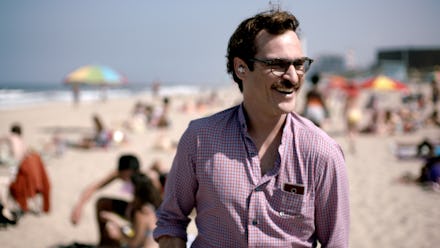'Her' is a Futuristic Tale With 21st Century Sexism

"In Her, the great question isn't whether machines can think, but whether human beings can still feel," writes New York Times co-chief film critic Manohla Dargis of the romantic drama, which opened December 18. The question is one that protagonist Theodore Twombly (Joaquin Phoenix) struggles with when he falls in love with his intelligent operating system, Samantha (Scarlett Johannson). And it's through Samantha that he's finally able to answer it.
Her is "a Spike Jonze love story," a well-crafted tale set in the future that mirrors our modern relationships with technology and one another almost too realistically. But the film's use of this tired trope — that is, that women exist to help men discover their feelings — turns an otherwise unique love story into the same one we've always heard.
Theodore is lonely: He's dealing with the breakup of his marriage with his wife (Rooney Mara), has few human interactions apart from those with his best friend (Amy Adams), colleague (Chris Pratt), and one-time date (Olivia Wilde), and is further isolated by the distance between people that technology has created in Jonze's futuristic world. Theodore works for a company called Beautifully Handwritten Letters, writing sentiments for those who can't express their feelings — which of course is something Theodore struggles with himself.
With everyone constantly plugged in to something and shutting one another out, it's no wonder Theodore falls for his OS. She's always accessible and available via his earpiece, and is programmed to respond to him. She is, quite literally, there to be whatever he needs her to be; she's able to read his the nuances of his behavior and anticipate his moves, and adjust herself accordingly. And in doing so, Samantha opens Theodore up to living more fully and loving more deeply — almost like a digital Manic Pixie Dream Girl 2.0.
Photo courtesy Warner Bros.
The MPDG is often found in romantic dramas, and she "exists solely in the fevered imaginations of sensitive writer-directors to teach broodingly soulful young men to embrace life and its infinite mysteries and adventures" — think Kirsten Dunst in Elizabethtown, Natalie Portman in Garden State, Zooey Deschanel in 500 Days of Summer, and, most recently, Julianne Moore in Don Jon. It's a role women play frequently in love stories, where their character's frivolity or wackiness helps open up their troubled, serious male partner.
Samantha's character has more depth than a typical MPDG, and Her is almost as much a story of Theodore's journey as it is hers, but she still primarily exists as a tool to guide him along. She's bubbly and quirky, and she breathes life back into Theodore: She breaks him out of his shell, leading him around with his eyes closed while she directs him on a "date," and she encourages his goofy and creative sides (they even sing together while he plays the ukulele). He's happy, he's smiling again, he's excited about life. "I love the way you look at the world," he tells her. Samantha encourages him to talk about his feelings and sign his divorce papers so he can move forward with his life, and Theodore begins to unravel why his marriage dissolved and what it means to love again — because she's teaching him how.
Photo courtesy Warner Bros.
Samantha quickly grows more knowledgeable about herself and the world around her, and begins to display an immense sense of self-awareness. While she will forever remain a piece of software, her exploration of her own machinery and feelings — her "humanity," if you will — is a catalyst for Theodore to explore his own.
This plot aspect can't be written off as pure sexism, especially given the complexity and depth of both characters' feelings, but it's a trope so often employed in film that it's hard not to wonder how much more unique Her could have been if the roles were reversed. When women are the means by which men learn what it means to feel, it perpetuates the notion that women are supposed to be their "teachers," and implies that men have nothing to teach women — which is obviously untrue.
Photo courtesy Warner Bros.
These are not stereotypical characters by any means. Phoenix plays Theodore skillfully, and Johansson creates a complex, robust presence without ever appearing on screen. But for such a unique story, the reliance on the tired trope that women are the vehicle through which men understand themselves and their feelings renders an otherwise original idea typical.